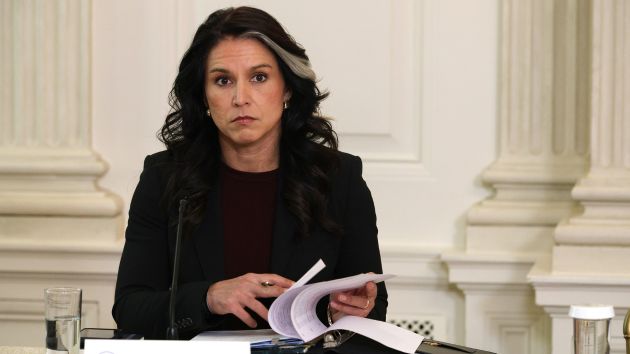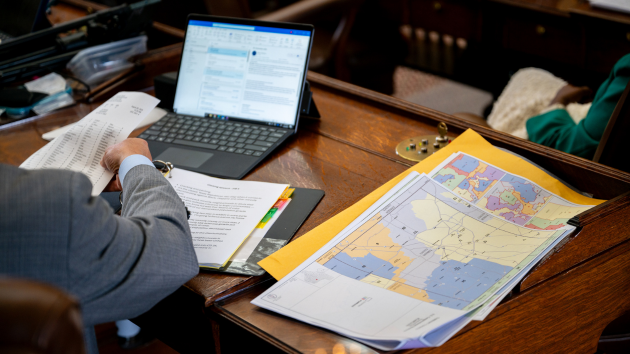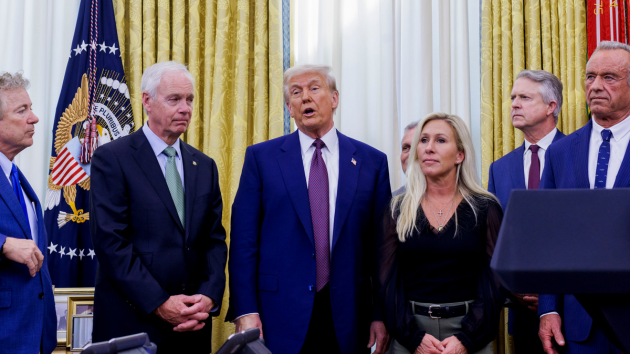Defense Secretary makes historic visit to Papua New Guinea as US counters China’s influence in South Pacific
Written by ABC Audio ALL RIGHTS RESERVED on July 26, 2023

(PORT MORESBY, Papua New Guinea) — Lloyd Austin’s arrival in Papua New Guinea on Wednesday marked the first time that an American Defense Secretary has visited the island nation reflecting its growing strategic importance as the U.S. tries to rein in China’s growing influence in the South Pacific.
That competition with China has escalated American efforts to increase security cooperation with Papua New Guinea (PNG) as China has been making security inroads with the neighboring Solomon Islands and increasing its economic ties with other Pacific Island nations.
Austin is the latest senior American leader to visit Papua New Guinea, highlighting the importance the United States is placing on its relationship with the country located just north of Australia.
The visit will build on the Defense Cooperation Agreement (DCA) worked out between the U.S. and Papua New Guinea earlier this year that will increase security cooperation between the two countries.
Secretary of State Antony Blinken visited in May to sign the cooperation agreement when he took the place of President Joe Biden who had to cancel a stop in Papua New Guinea so he could return to Washington for negotiations on the debt limit.
It is not just the United States that sees the importance of Papua New Guinea in checking China’s influence in the region, however.
Later this week, France’s President Emmanuel Macron will make history as he becomes the first French president to visit the island nation.
On Thursday, Austin will meet with PNG’s Prime Minister James Marape, Defense Minister Win Badri Daki and other top military leaders from the island nation.
U.S. officials are also looking towards a possible expansion of a recent “boatrider” agreement that will allow Papua New Guinean military personnel to ride along U.S. Coast Guard vessels as they track unregulated fishing.
The Defense Cooperation Agreement has yet to be ratified by PNG’s parliament and Prime Minister Marape has faced domestic criticism and protests from Papua New Guineans concerned that it might infringe on the country’s sovereignty.
But U.S. officials see the agreement as a major milestone and that expanding military cooperation between the two countries will improve security in the region, increase U.S. training opportunities for Papua New Guinea’s military and help the U.S. respond to humanitarian and regional crises.
The security agreement is part of a broad U.S. effort to improve relations with island nations in the region in the wake of a security agreement signed last year between the Solomon Islands and China.
That agreement has been seen as a major driver in the broad U.S. effort to reach out to Pacific Island nations that also have tight economic ties with China.
“The U.S. has been playing catch-up in the South Pacific since the China-Solomon Islands security deal was leaked last year,” Mihai Sora, the project director for the AUS-PNG Network at the Lowy Institute, told ABC News.
“China is still on the look-out for opportunities to expand its relationships with Pacific countries in the security space,” said Moha.
“Pacific countries value their economic relations with China. Some, like PNG, are happy to take security assistance support from the U.S., but will not want to jeopardize economic relations with China,” he added.
Acknowledging the fine line the U.S. must tread in its outreach to island nations in the South Pacific, a senior U.S. defense official made clear that the U.S. is not asking them to have to choose between the U.S. and China.
“Our approach is to demonstrate value and to demonstrate the ways in which we can contribute meaningfully to a long term mutually beneficial security relationship,” said another U.S. defense official. “And that’s what we’re seeking to do, not just with PNG but with the whole region.”
U.S. officials have stressed that the agreement does not mean that American troops will be stationed on the island which saw a sizable U.S. presence during World War II. Though it is possible that after it is ratified, the U.S. and Papua New Guinea might begin talks about a rotational U.S. military presence.
“It certainly changes the status quo for Papua New Guinea’s security cooperation with other countries in that the Defense Cooperation Agreement lays out extensive U.S. access to PNG territory,” said Sora.
Sora believes the United States moved too quickly in working out the agreement and will have to work to gain support while it is being implemented.
“It moved extremely fast to get that signature, which has caused some frictions in the region,” said Sora. “And asking for too much, too soon will ultimately be counterproductive to U.S. influence and access-building efforts in the Pacific.”
Papua New Guinea is one of only three Pacific island nations that has a military, the other two are Fiji and Tonga.
Troops from all three nations are participating for the first time in the Talisman Sabre exercise being held in Australia this year — the largest version of the exercise to date with 30,000 troops from 13 countries joining in the exercise held every two years.
After his visit to Papua New Guinea, Austin will travel to Brisbane, Australia, where he will join Blinken for an annual meeting with their Australian counterparts.
The annual meetings have taken on a greater significance in recent years as the U.S. and Australia have developed closer security ties to counter China’s territorial claims in the South China Sea and provocations towards Taiwan.
That includes the rotational presence of up to 2,500 U.S. Marines for regular training exercises in northern Australia.
Ahead of this weeks’ meetings, U.S. defense officials signaled an expansion of those bilateral security agreements that could lead to additional rotations involving different military services and capabilities.
Later in the week, Austin and Australian Defense Minister Richard Marles will observe U.S. and Australian troops participating in the Talisman Sabre exercise.
Copyright © 2023, ABC Audio. All rights reserved.

 KVSP
KVSP 




